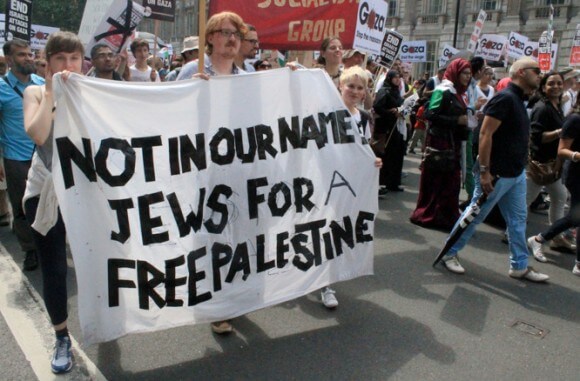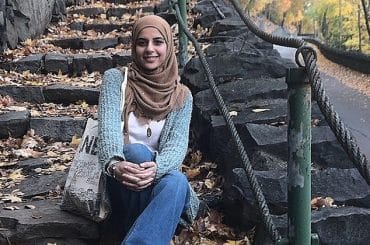My personal experience was very similar to those of the other American Jews in the film: A childhood in a reform Jewish community and a passive acceptance of all things Israeli as part and parcel to my Jewish identity. This came, I should add, from my community institutions, not from my family. Nonetheless, the connection I thought I felt to Israel as a young person was powerful, albeit unexamined. In college, I was confronted with confusing contradictions, then participated in a Birthright trip during the 2006 Lebanon war that catapulted me into a serious examination of my long-held ideas about the Middle East. I began to face criticism from my Jewish colleagues and peers. But I had to keep in mind that this difficult experience of “political awakening,” so to speak – while it was profound for me in many ways – was minor when compared to the kinds of difficulties that Palestinians must face as they struggle to negotiate their places in academic, professional and other realms. I want to be careful to avoid what Steve Biko, writing on the white liberals in Apartheid South Africa, called “claiming a monopoly on intelligence and moral judgment and setting the pattern and pace for the realization of [in this case, Palestinian] aspirations.” So, I am aware that if there is ever to be a just solution in Palestine, it will be, first and foremost, the result of Palestinian efforts. Palestinian voices – not Jewish ones – really do need to be front and center. But this is one reason why this film and the stories in it are so critical: in order to help create more space with Palestinians for Palestinian voices, American Jews need to work diligently at dismantling this notion that any serious critique of Israel is a critique of Jews or Judaism. As a Jew, I am uniquely suited to this role, and it is a role I am still trying to figure out how best to fill.
Bearing this in mind, I have approached with cautious determination questions about Zionism as a movement, about American political support for the state of Israel, and about my role as an American Jew in this discussion. My questions have led me, for the most part, to more questions. But one thing is very clear: This is not about Jews vs. Palestinians. Looking at it as such distracts from some very important realities.
One important question I have tried to understand is: what historical processes went into and continue to shape the current discourse on Zionism? I have tried to look at what was at stake in this effort to couple Judaism and Zionism and who stood to gain from such efforts. These questions led me throughout graduate school to research the history and current manifestations of Christian Zionism, a movement that actually pre-dates Theodor Herzl – widely considered to be the father of Jewish Zionism – by hundreds of years. The relationship of the American Christian Zionist movement to Jews and to Palestinians – both Muslim and Christian – can be an odd one, at once intertwined with broader political philosophies of the American right, American exceptionalism, notions of philanthropy, and, I would argue, racist and reductive views of Jews, Palestinians and “The Holy Land”. Today, Christians United for Israel is the largest pro-Israel organization in the United States and boasts of strong connections at the highest levels of American politics.
I introduce this topic here to illustrate my point that the discussion surrounding Israel and Palestine is not about Jews vs. Palestinians. Zionism is not even strictly a Jewish ideology. Yet, so many Jews see Israel’s relative success over the past 70 years as a result of a Jewish moral righteousness. They see an Israeli David vs. the Goliath of the rest of the world. So many believe that Israel needs to exist first and foremost to ensure Jewish survival. All of these ideas serve to silence critical Jewish voices and all of these ideas share the same blind spot: they fail to recognize that so many others out there have something at stake in Israel’s success that has little or nothing to do with protecting Jews from another Nazi Holocaust, nothing to do with ensuring human rights for Palestinians, and that these people are very powerful.
So, as Jews, if we choose to throw our hat into the ring when it comes to the conversation on Palestinian rights, we need to be prepared to account for who else is out there claiming to speak in our names. We need to remain firm in our commitment to continually opening up space with and for Palestinians to speak on their own behalves. We can do this by chipping away at the tired Zionist tropes so often used to silence them. This film is an important step in that direction. I hope it serves as a catalyst to action for others who may identify with the experiences recounted within it. For me, watching the film was cathartic and has certainly inspired me to work harder to establish a Jewish community here in Champaign-Urbana where anti- and non-Zionist views are accepted and even championed.
I am very flattered to have been invited to speak alongside the others here. And I would like to extend a special thank you to Dr. Bruce Robbins for his work on this very important topic.



It shouldn’t be about Jews vs Palestinians but if you look at it from a political economy lens, it is.
Jews have a standard of living 10–15 times that of Palestinians in Erez Israel. and Jews in the Diaspora are used to protect and defend that.
There aren’t enough Jews who oppose the status quo, worthy and all as those who do take a stand are. The system proceeds serenely because it has no effective opposition.
This is about money and power, not how sensitive people see things.
So how was it canceled at the university?
RE: “The relationship of the American Christian Zionist movement to Jews and to Palestinians – both Muslim and Christian – can be an odd one, at once intertwined with broader political philosophies of the American right, American exceptionalism, notions of philanthropy, and, I would argue, racist and reductive views of Jews, Palestinians and ‘The Holy Land’. . .” ~ Samantha Brotman
A SPECIAL EDITION MUSICAL INTERLUDE, proudly brought to you by the makers of new Über-Xtreme Ziocaine Ultra™ : It’s guaran-damn-teed to to blow your effing mind or double your money back!℠
■ Richard Crooks sings “The Holy City” (Adams/Weatherly) with Herbert Dawson at the organ ~ Orchestra conducted by Sir John Barbirolli ~ Recorded in London on Oct 3, 1935
● VIDEO (05:00) – http://www.youtube.com/watch?v=9uE4qZUdsM4
● LYRICS – http://www.james-joyce-music.com/song11_lyrics.html
P.S. IMPORTANT NOTICE: Always use new Über-Xtreme Ziocaine Ultra® responsibly. Do not attempt to drive or operate heavy equipment until you know how new Über-Xtreme Ziocaine Ultra® will affect you.
P.P.S. Ziocaine™ is a registered trademark of The Mooser Corporation, U.S.A.
” Today, Christians United for Israel is the largest pro-Israel organization in the United States and boasts of strong connections at the highest levels of American politics. – “”
CZs are retarded lunatics —but I’ve never been able to find any evidence of their influence in the ‘highest levels’ of American politics….as in being able to dictate policy and write bills for congress to pass like AIPAC does.
All my research into this has turned up is the CZ pockets in various states success in electing a CZ or Old Testament bible thumper to congress or the senate from their district.
And the amount of money they raise primarily for Israeli settlements.
So you’d have to prove this to me……by naming names and their connections and citing examples.
Ms. Brotman,
This was an interesting essay. In case you didn’t already notice, strong PEPs have an “anything goes” attitude when it comes to evaluating the state’s policies toward Palestinians. That’s because in their mindset, Palestinians are associated with Islamic terrorism, anti-semitism, attempts to destroy the Israelis, the Mufti in WWII, etc. It’s unfortunate, but there is not that much that the state could realistically do that would discredit the state in their eyes.
If you think otherwise, talk to some of those strong PEPs. They have a siege mentality, their discussions of Palestinians are extremely hostile, and their defense of what human rights activists see as Israeli abuses in Gaza and elsewhere are very intense too.
I don’t know that it’s easy to change their views either then, as I discussed with Annie.
What might be helpful is to understand their underlying motivations. Namely, why are PEPs militantly nationalistic, but everyday American liberals aren’t? What is it that makes nationalism appeal to PEPs that doesn’t to most American liberals?
In my opinion, this is an important area for critical progressive discussions on the topic to explore, and it sounds like you are to some extent doing this, as you describe your “conversion” experience.